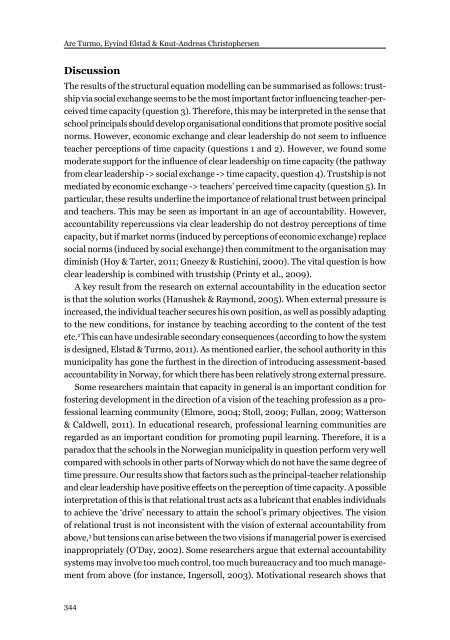Download issue - Umeå universitet
Download issue - Umeå universitet
Download issue - Umeå universitet
Create successful ePaper yourself
Turn your PDF publications into a flip-book with our unique Google optimized e-Paper software.
Are Turmo, Eyvind Elstad & Knut-Andreas Christophersen<br />
Discussion<br />
The results of the structural equation modelling can be summarised as follows: trustship<br />
via social exchange seems to be the most important factor influencing teacher-perceived<br />
time capacity (question 3). Therefore, this may be interpreted in the sense that<br />
school principals should develop organisational conditions that promote positive social<br />
norms. However, economic exchange and clear leadership do not seem to influence<br />
teacher perceptions of time capacity (questions 1 and 2). However, we found some<br />
moderate support for the influence of clear leadership on time capacity (the pathway<br />
from clear leadership -> social exchange -> time capacity, question 4). Trustship is not<br />
mediated by economic exchange -> teachers’ perceived time capacity (question 5). In<br />
particular, these results underline the importance of relational trust between principal<br />
and teachers. This may be seen as important in an age of accountability. However,<br />
accountability repercussions via clear leadership do not destroy perceptions of time<br />
capacity, but if market norms (induced by perceptions of economic exchange) replace<br />
social norms (induced by social exchange) then commitment to the organisation may<br />
diminish (Hoy & Tarter, 2011; Gneezy & Rustichini, 2000). The vital question is how<br />
clear leadership is combined with trustship (Printy et al., 2009).<br />
A key result from the research on external accountability in the education sector<br />
is that the solution works (Hanushek & Raymond, 2005). When external pressure is<br />
increased, the individual teacher secures his own position, as well as possibly adapting<br />
to the new conditions, for instance by teaching according to the content of the test<br />
etc. 2 This can have undesirable secondary consequences (according to how the system<br />
is designed, Elstad & Turmo, 2011). As mentioned earlier, the school authority in this<br />
municipality has gone the furthest in the direction of introducing assessment-based<br />
accountability in Norway, for which there has been relatively strong external pressure.<br />
Some researchers maintain that capacity in general is an important condition for<br />
fostering development in the direction of a vision of the teaching profession as a professional<br />
learning community (Elmore, 2004; Stoll, 2009; Fullan, 2009; Watterson<br />
& Caldwell, 2011). In educational research, professional learning communities are<br />
regarded as an important condition for promoting pupil learning. Therefore, it is a<br />
paradox that the schools in the Norwegian municipality in question perform very well<br />
compared with schools in other parts of Norway which do not have the same degree of<br />
time pressure. Our results show that factors such as the principal-teacher relationship<br />
and clear leadership have positive effects on the perception of time capacity. A possible<br />
interpretation of this is that relational trust acts as a lubricant that enables individuals<br />
to achieve the ‘drive’ necessary to attain the school’s primary objectives. The vision<br />
of relational trust is not inconsistent with the vision of external accountability from<br />
above, 3 but tensions can arise between the two visions if managerial power is exercised<br />
inappropriately (O’Day, 2002). Some researchers argue that external accountability<br />
systems may involve too much control, too much bureaucracy and too much management<br />
from above (for instance, Ingersoll, 2003). Motivational research shows that<br />
344

















